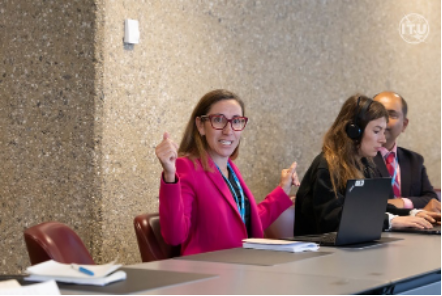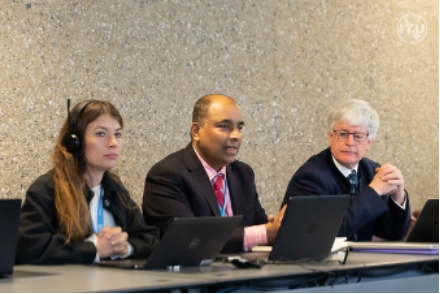This event recap was written by Prof G Hari Harindranath and originally published via the UNESCO Chair in ICT4D.
MIDEQ WP9 convenes thematic workshop at WSIS 2023, Geneva
Following the success of our online thematic workshop held during the World Summit on the Information Society (WSIS) 2022 meeting, the MIDEQ WP9 (digital tech, inequality and migration) team convened a hybrid thematic workshop at the WSIS Annual Forum 2023 in Geneva on 17th March examining ‘what migrants want’ in relation to the use of digital technologies as opposed to the numerous apps that are supposedly designed for them. Building on our ongoing research (see https://ict4d.org.uk/technology-inequality-and-migration/ and https://www.mideq.org/en/themes/digital-technologies-and-inequality/), we explored how co-design with migrants can help craft digital interventions that can usefully address migrant-defined inequalities.
Digital technologies are both a lifeline and an increasing source of concern for migrants around the world. While these technologies can help address the many inequalities migrants face, they can also exacerbate such inequalities and create new ones. This session will feature an interactive discussion on our digital intervention-research with migrants, migrant organisations and digital tech companies supported by international organisations such as IOM, UNESCO, ILO and GSMA as part of a larger project, Migration for Development and Equality (MIDEQ), focused on “the complex and multi-dimensional relationships between migration and inequality in the context of the Global South”.
The session will critically examine ‘what migrants want’ in relation to the use of digital technologies as opposed to the numerous apps that are supposedly designed for them. Building on our ongoing research, which suggests that migrants rarely use or trust such apps, we will explore how co-design with migrants can help ensure digital interventions that can usefully address migrant-defined inequalities. We will showcase our efforts in Nepal and South Africa undertaken with the direct involvement of migrants, migrant organisations and advocacy groups, and local digital tech companies with the support of relevant international organisations such as GSMA, IOM, ILO and UNESCO.


The session, which aligned especially with SDG10 and WSIS Action Lines C3, C4, C5, C7(iii, iv,v), C8 and C10, was structured around our digital interventions from Nepal and South Africa using a series of short-form videos ‘created by migrants for migrants’ as a framing device for the discussion. The contributions highlighted many inequalities faced by migrants and how digital tech can meaningfully address them as well as how digital tech can support personal life choices, offer networking opportunities, and become a peer-to-peer learning tool. The overarching theme was the need for all actors at the interface of digital tech and migration to be mindful of the need to ensure the safe, secure and wise use of digital tech by migrants.
Despite increasing evidence of the challenges to the beneficial use of digital tech by vulnerable migrants, actors such as tech companies, international and local organisations continue to design technologies aimed at migrants without due regard to their unintended consequences. International organisations and fora such as WSIS that are at the forefront of digital inclusion must recognise not just the opportunities offered by digital tech for migrants but also the risks and harms associated with them. This is especially important given the pervasive structural inequalities and limited digital capabilities that characterise many migrant contexts.
WP9 co-lead Prof G Hari Harindranath led the session with Prof Tim Unwin and Dr Maria Rosa Lorini while Bryce Hartley from GSMA (online) and Julien Varlin from ILO Geneva served as discussants. The highly interactive hybrid session was attended by senior government officials and representatives from international organisations, CSOs and tech companies as well as researchers.
We also used the in-person WSIS Forum in beautiful Geneva as an opportunity to discuss pathways to impact for our work with colleagues at IOM and ILO.
